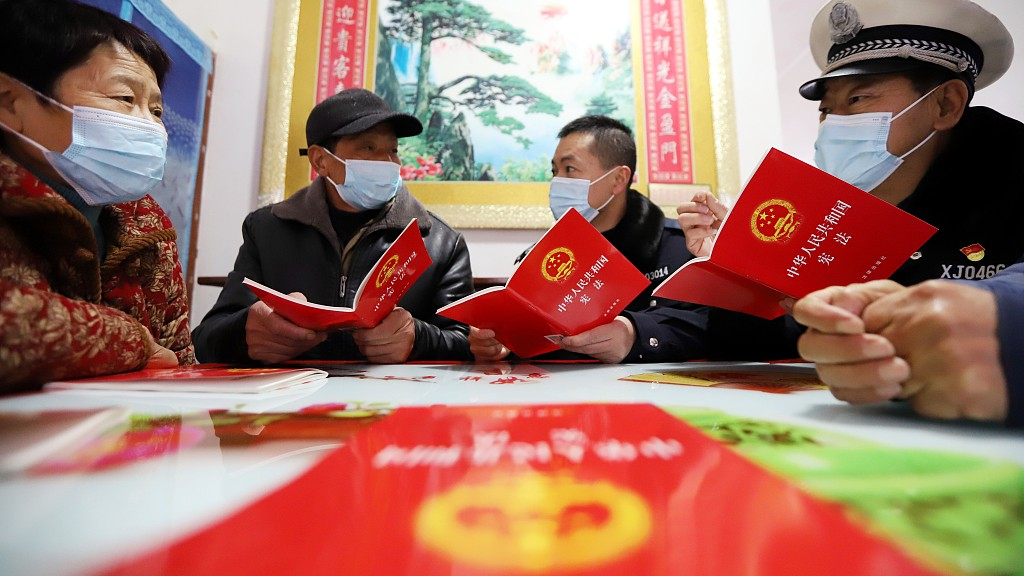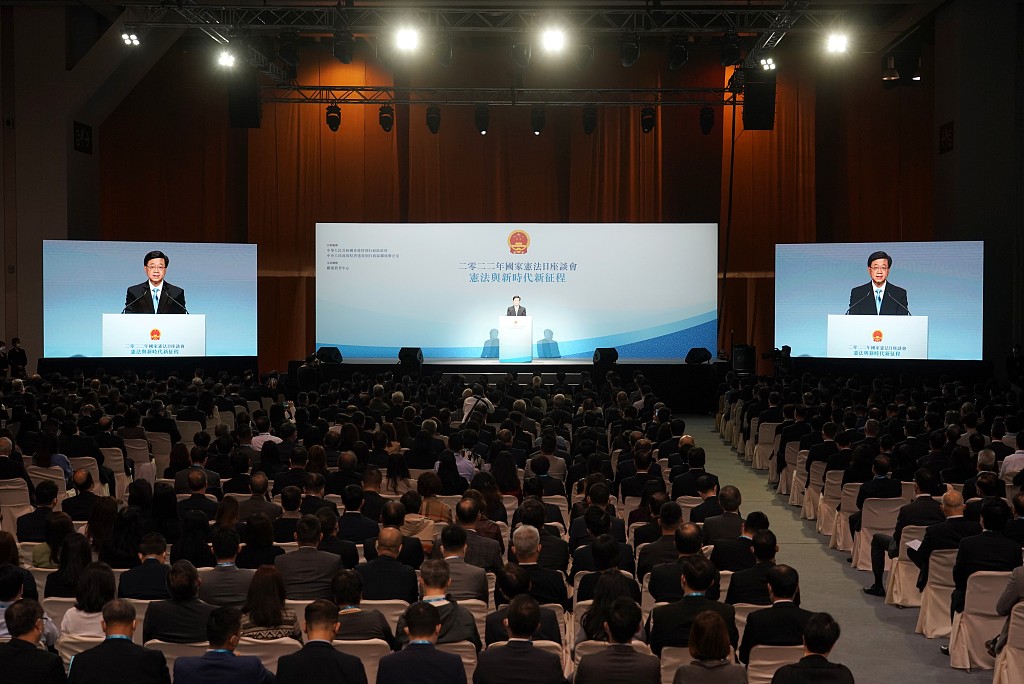
Community workers teach the 1982 Constitution of the People's Republic of China to local residents in Wuhu, southeast China's Anhui Province, December 4, 2022. /CFP
Community workers teach the 1982 Constitution of the People's Republic of China to local residents in Wuhu, southeast China's Anhui Province, December 4, 2022. /CFP
Editor's note: Zhu Zheng is an assistant professor specializing on constitutional law and politics at China University of Political Science and Law. The article reflects the author's opinions and not necessarily the views of CGTN.
This year marks the 40th anniversary of the 1982 Constitution of the People's Republic of China (PRC). On December 19, People's Daily published a signed article by President Xi Jinping, which provides an in-depth analysis of the Constitution's characteristics and explains why and in what way we might carry out the constitutional promises.
First of all, President Xi calls the current constitution the "People's Constitution" because the document was drafted by the people under the leadership of the Communist Party of China (CPC); it reflects the common will of the people and ensures the Party's policies are integrated with the people's aspirations. This also indicates that the 1982 Constitution does not represent the elite but the majority's will and it has been supported by the people.
Secondly, the article attaches great importance to the constitutional revisions in the past four decades, calling it a "must" and "timely." In the president's mind, the revisions would not only develop and consummate the document, but also lead the socialist rule of law forward and strengthen the Party's ability to promote the law-based governance.
Thirdly, President Xi explicates why the socialist rule of law matters, and what we have achieved thus far in this regard. For one thing, the Party has institutionally established the CPC Central Committee on Major Issues Pertaining to Comprehensively Promoting the Rule of Law, a committee which oversees the law-making efforts, judicial activities and law enforcement business.
For another, since the 18th Party Congress in 2012, the implementation of the Constitution has been constantly underscored by the Party and some concrete steps have been taken. For example, the National People's Congress Standing Committee has set the National Constitutional Day to enhance constitutional education. And the NPC Standing Committee has decided to implement the constitutional oath system, requiring all civil servants to take a public oath to the Constitution when taking office.

On the 2022 National Constitution Day, the Hong Kong Special Administrative Region (HKSAR) Government and the Liaison Office of the Central People's Government in the HKSAR jointly hold a symposium themed "Constitution, New Era and New Journey" in Hong Kong, China, December 4, 2022. /CFP
On the 2022 National Constitution Day, the Hong Kong Special Administrative Region (HKSAR) Government and the Liaison Office of the Central People's Government in the HKSAR jointly hold a symposium themed "Constitution, New Era and New Journey" in Hong Kong, China, December 4, 2022. /CFP
But nothing is more important than the measures taken by the central government to build a constitutional review system with Chinese characteristics. Since the Constitution was revised in 2018, a special commission called the "Constitution and Law Commission" has been set up to be in charge of reviewing the constitutionality of all laws and regulations. To be specific, the Commission has been vested with the power to check whether administrative regulations, local rules, and judicial interpretations are constitutional or not. While military documents, Party red-head letters, and supervision by-laws still remain to be reviewed, there is no doubt that the scope of the review will be further expanded in the years to come.
President Xi's article has pointed out that the significance of the achievements cannot be overstated, but in the future, some efforts are yet to be made in the following areas to make good on the commitments enshrined in the Constitution.
First of all, to consolidate the Party's leading role in implementing the Constitution. Now that the new Constitution has enshrined the prominent status of the Party, the normative promise will find a way to enter the reality – the president regarded it as a fundamental guarantee that ensures the right political direction.
Secondly, to put the people in the central place. As the 20th Party Congress stressed, the people should enjoy the supremacy in China's political life, and this requirement will be entrenched as a guiding philosophy in all stages of implementing the Constitution.
Thirdly, to further improve the Chinese legal system under the Constitution. The legal system should be more comprehensive, systematic, and coherent, especially it should always make reference to the constitutional provisions, principles, and spirits.
Fourthly, China should find its own way to implement the Constitution. The president calls for more efforts to implement, interpret and supervise the Constitution, so that the document can be more responsive to the concerns in reality.
Finally, to further improve the theoretical exploration and constitutional education. A comprehensive academic system of the constitution should be built and more concrete mechanisms such as taking an oath and commemorating the Constitution should be established so as to intensify people's understanding of the Constitution.
The 1982 PRC Constitution has never been taken so seriously in history. After four decades of evolution, the government has developed a set of institutions and concrete regulations to ensure its implementation. There are reasons to believe that it will continue to advance Chinese-style modernization and usher in more positive changes.
(If you want to contribute and have specific expertise, please contact us at opinions@cgtn.com. Follow @thouse_opinions on Twitter to discover the latest commentaries on CGTN Opinion Section.)